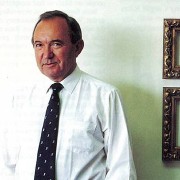Standing in Judgement
Judge Richard Goldstone is a man well acquainted with the forces of violence in South Africa. As chairman of the Goldstone Commission of Inquiry into Public Violence and Intimidation – a judicial panel spawned by a multiparty peace accord in 1991- he has developed a finely tuned understanding of the social, political and economic dynamics fuelling conflict in the country. Since its inception in 1991, the Goldstone Commission has held open inquiries into every major area of public violence in South Africa and made countless recommendations on methods to control it. With the noticeable downtrend in politically related bloodletting since South Africa’s democratic transition in April, the Goldstone Commission’s work is tailing off and the judge is heading to The Hague to become chief prosecutor of a UN tribunal on crimes against humanity in Bosnia. Helen Grange spoke to Goldstone about his perceptions of violence in South Africa and the likely path head.
There has been much emphasis on political violence in South Africa, but to what extent has it been driven by economic factors and what will future trends be? The figures speak for themselves. Eighty eight per cent of the violence over the past four years has been economically or non-politically driven. Political violence has accounted for about 12 percent. In the post-election period, political violence has dropped very significantly. I don’t think political violence is going to be a serious factor anymore. However, in common with many countries, we’ve got a lot of work to do in dealing with the root causes of violence caused by economic considerations. What are the causes of non-political violence? 34 Unemployment and unsatisfactory living conditions, but also, there is a lot of criminal violence such as hijackings and bank robberies. I don’t believe these criminals have starving children. Given this reality, however, the percentage of people who resort to criminal violence is small. There’s only one way to stop criminal conduct of-any kind and that’s through good policing, and 1 have no doubt that is going to improve considerably over the short to medium term with an acceptable, legitimate police force. How long will it take for the new police force to accomplish real legitimacy? It’s a lot easier for the police to handle Jaw enforcement now than it was before the election. The great majority of South Africans are going to have more and more confidence in the legitimacy SOUTH AFRICA and acceptability of the police and it will become more difficult for people to operate outside of the police as self-appointed law enforcement agencies. Regarding ANC-aligned self defence units which were formed to protect township communities against covert police action in the old South Africa: is there potential for them to form gangs and become organised criminals? The continued existence of self defence units is a specific society problem in the areas east of Johannesburg. It shouldn’t be blown up into a national illness. I see these areas improving, not getting worse, because the fundamental causes prompting the formation of the self defence units have been removed and it will become more difficult to operate outside of the police force.
Do you think the new government has the full co-operation of its security forces in cracking down on violence and crime? People act in self-interest and it’ll be in the self-interest of the security forces to protect themselves and do what the government wishes. There is fear that government’s new reconstruction and development policies have created unrealistic expectations. Do you think this could lead to frustrations which could fuel violence? I’m not pessimistic because the African National Congress was commendably restrained in not making promises which can’t be realized. Expectations are obviously high, so for that reason I hope the housing development plans come to fruition and get to sufficient people. As long as people see things happening, even if it’s not happening to them but they know they will get assistance somewhere down the line, they will be satisfied. Violence in Natal has been more continual than the wars which have erupted at intervals in the East Rand townships. What is the nature of the Natal violence and will it end? There are ethnic and tribal aspects to the violence in Natal, but on balance, it is more about basic economics – the battle for resources. It has decreased significantly and can be further contained. How has the Goldstone Commission’s work helped create a bulwark against violence? The most important achievement was the agreement we clinched with the political parties in July 1992 on guide lines for mass marches and demonstrations. It SOUTH AFRICA has saved countless lives. There’s a fairly sensible attitude which has emerged on all sides since that agreement. Do you think South Africa still needs to have extra-governmental bodies like the Goldstone Commission to deal with violence? No. I optimistically believe it is not necessary. If there is a political flare-up, it should be handled by the democratic government’s security forces. Criminal conduct should also be dealt with in the same way. It’s no longer a situation of transition, and the authorities must exert their authority. You seem to be very optimistic about the future. Are you? To be pessimistic is against the weight of evidence. If I had told you four years ago where we are now, you would have said: Please God, let it be.
South Africa, The Journal of Trade, Industry and Investment
Publisher: David Altman
Writer: Helen Grange



